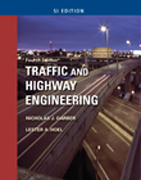
The new edition of Garber and Hoel's best-selling text focuses on giving students insight into all facets of traffic and highway engineering. Students generally come to this course with little knowledge or understanding of the importance of transportation, much less of the extensive career opportunities withinthe field. Transportation is an extremely broad field, and courses must either cover all transportation modes or focus on specifics. While many topics can be covered with a survey approach, this often lacks sufficient depth and students leave the course without a full understanding of any of the fields. Garberand Hoel's text focuses exclusively on traffic and highway engineering. They begin with a discussion of the pivotal role transportation plays in our society, including employment opportunities, historical impact, and the impact of transportation on our daily lives. This approach gives students a sense of what the field is about and an opportunity to consider some of its challenges. Later chapters focus on specific issues facing transportation engineers. The text uses pedagogical tools such as worked problems, diagrams and tables, referencematerial, and realistic examples to demonstrate how the material is applied. INDICE: Part 1 - Introduction. 1. The Profession of Transportation Engineering - Importance of Transportation; Transportation History; Transportation Employment; Summary; Problems; References. 2. Transportation Systems and Organizations - Developing a Transportation System; Modes of Transportation; Transportation Organizations; Summary; Problems; References.. Part 2 - Traffic Operations. 3. Characteristics of the Driver, the Pedestrian, the Vehicle, and the Road - Driver Characteristics; Perception-Reaction Process; Older Drivers' Characteristics; Pedestrian Characteristics; Bicyclists and Bicycles Characteristics; Vehicle Characteristics; Road Characteristics; Summary; Problems; References. 4. Traffic Engineering Studies - Spot Speed Studies; Volume Studies; Travel Time and Delay Studies; Parking Studies; Summary; Problems; References. 5. Highway Safety - Issues Involved in Transportation Safety; Strategic Highway Safety Plans; Effectiveness of Safety Design Features; Summary; Problems; References. 6. Fundamental Principles of Traffic Flow - Traffic Flow Elements; Flow-Density Relationships; Shock Waves in Traffic Streams; Gap and Gap Acceptance;Introduction to Queuing Theory; Summary; Problems. 7. Intersection Design - Types of At-Grade Intersections; Design Principles for At-Grade Intersections; Design of Railroad Grade Crossings; Summary; Problems; References. 8. Intersection Control - General Concepts of Traffic Control; Conflict Points at Intersections; Types of Intersection Control; Signal Timing for Different Color Indications; Freeway Ramps; Summary; Problems; References. 9. Capacity and Level ofService: Two-Lane and Multilane Highways - Two-Lane Highways; Freeways; Multilane highways; Summary; Problems; References; Appendix: Tables. 10. Capacity and Level of Service at Signalized Intersections - Definitions of Some Common Terms; Level of Service at Signalized Intersections; Summary; Problems; References; Appendix:Tables.. Part 3 - Transportation Planning. 11. The Transportation Planning Process - Basic Elements of Transportation Planning; Transportation Planning Institutions; Urban Transportation Planning; Forecasting Travel; Summary; Problems; References. 12. Forecasting Travel Demand - Demand Forecasting Approaches; Trip Generation; Trip Distribution; Mode Choice; Traffic Assignment; Other Methods for Forecasting Demand; Estimating Freight Demand; Traffic Impact Studies; Summary; Problems; References. 13. Evaluating Transportation Alternatives - Basic Issues in Evaluation; Evaluation Based on Economic Criteria; Evaluation Based on Multiple Criteria; Summary; Problems; References.. Part 4 - Location, Geometrics, and Drainage. 14. Highway Surveys and Location - Principles of Highway Location; Highway Survey Methods; Highway Earthwork and Final Plans; Summary; Problems; References. 15. Geometric Design of Highway Facilities - Factors Influencing Highway Design; Design of the Alignment; SpecialFacilities for Heavy Vehicles on Steep Grades; Bicycle Facilities; Parking Facilities; Computer Use in Geometric Design; Summary; Problems; References. 16.Highway Drainage - Surface Drainage; Highway Drainage Structures; Sediment and Erosion Control; Hydrologic Considerations; Unit Hydrographs; Hydraulic Design of Highway Drainage Structures; Subsurface Drainage; Economic Analysis; Summary; Problems; References; Additional Readings. . Part 5 - Materials and Pavements. 17. Soil Engineering for Highway Design - Soil Characteristics; Basic Engineering Properties of Soils; Classification of Soils for Highway Use; SoilSurveys for Highway Construction; Soil Compaction; Special Soil Tests for Pavement Design; Frost Action in Soils; Summary; Problems; References. 18. Bituminous Materials - Sources of Asphalt; Description and Uses of Bituminous Binders; Properties of Asphalt Materials; Tests for Asphalt Materials; Asphalt Mixtures; Superpave Systems; Summary; Problems; References. 19. Design of FlexiblePavements - Structural Components of a Flexible Pavement; Soil Stabilization;General Principles of Flexible Pavement Design; Summary; Problems; References. 20. Design of Rigid Pavements - Materials Used in Rigid Pavements; Joints inConcrete Pavements; Types of Rigid Highway Pavements; Pumping of Rigid Pavements; Thickness Design of Rigid Pavements; Summary; Problems; References. 21. Pavement Management - Problems of Highway Rehabilitation; Methods for Determining Roadway Condition; Pavement Condition Prediction; Pavement Rehabilitation; Pavement Rehabilitation Programming; GIS and Pavement Management; Summary; Problems;. References. Appendixes. Index
- ISBN: 978-0-495-43853-3
- Editorial: Cengage
- Encuadernacion: Rústica
- Páginas: 1200
- Fecha Publicación: 20/12/2009
- Nº Volúmenes: 1
- Idioma: Inglés
